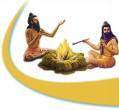Kena Upanishad By Naithrupan

Chapter 4 - Characteristics of Brahman Uma, the Goddess Parvathi, replied to Indra who enquired to know ‘Who is This Yaksha actually?’ thus: That is Brahman by whose power the battle was won. Only because through this victory, you have thus become great. Thus Indra had realized the truth behind their victory and glory. As Indra was the first god to meet and know Brahman, Indra did excel other gods. Fire God and Air God had also excelled other gods like Indra, as they had also met Brahman in the most proximities. Power of Brahman is enormous and all pervading. Whether in the flash of the lightning, or in the wink of the eyes, the power that is shown is the power of Brahman. In respect of man, the man’s mind is to be powered by the power of Brahman. For proper propelling of the mind, a man needs to meditate upon Brahman day and night. Brahman is the adorable being in all beings. Hence, one should meditate as such. He who mediates upon Brahman as such is honored by all other beings. A d